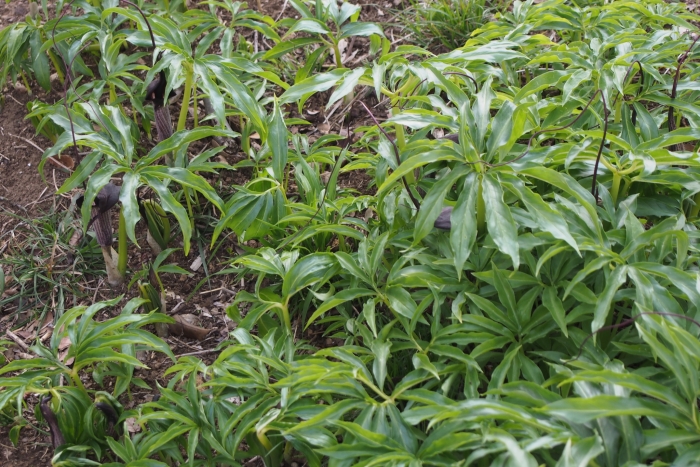Japanese Cobra Lily
(Arisaema urashima)
Japanese Cobra Lily (Arisaema urashima)
/
/

harum.koh
CC BY-SA 4.0
Image By:
harum.koh
Recorded By:
Copyright:
CC BY-SA 4.0
Copyright Notice:
Photo by: harum.koh | License Type: CC BY-SA 4.0 | License URL: http://creativecommons.org/licenses/by-sa/4.0/ | Rights Holder: harum.koh | Publisher: iNaturalist | Date Created: 2016-03-31T15:52:53-07:00 |













Estimated Native Range
Summary
Arisaema urashima, commonly known as Japanese Cobra Lily, is a deciduous perennial herb native to the understory of cool, moist forests in Japan and Korea. It typically grows to a height and width of 1-2 feet. The plant is notable for its unique inflorescence, which consists of a large, hood-like spathe that is purple and white, resembling a cobra about to strike, and a long, whip-like spadix that extends beyond the spathe. The flowers, which are not particularly showy, appear in spring and are followed by the foliage dying down by summer. In autumn, the fruiting spike ripens, bearing bright red berries that are attractive but contain high amounts of oxalic acid and are poisonous.
The Japanese Cobra Lily is valued for its exotic and unusual appearance, making it a conversation piece in shade gardens. It is often used in woodland garden settings, as an accent plant in shaded borders, or in containers. It requires consistently moist soil and thrives in part shade to full shade conditions. While it is generally low-maintenance, it is sensitive to drought and excessive sunlight. Gardeners should handle the plant with care due to its toxic properties, and it should be kept away from children and pets.CC BY-SA 4.0
The Japanese Cobra Lily is valued for its exotic and unusual appearance, making it a conversation piece in shade gardens. It is often used in woodland garden settings, as an accent plant in shaded borders, or in containers. It requires consistently moist soil and thrives in part shade to full shade conditions. While it is generally low-maintenance, it is sensitive to drought and excessive sunlight. Gardeners should handle the plant with care due to its toxic properties, and it should be kept away from children and pets.CC BY-SA 4.0
Plant Description
- Plant Type: Herb
- Height: 1-2 feet
- Width: 1-2 feet
- Growth Rate: Slow
- Flower Color: Purple
- Flowering Season: Spring
- Leaf Retention: Deciduous
Growth Requirements
- Sun: Part Shade, Full Shade
- Water: Medium, High
- Drainage: Medium
Common Uses
Bee Garden, Potted Plant, Rock Garden
Natural Habitat
The understory of cool, moist forests in Japan and Korea
Other Names
Common Names: Arisaema
Scientific Names: , Arisaema urashima, Arisaema thunbergii subsp. urashima, Arisaema thunbergii var. urashima, Arisaema thunbergii subsp. geomundoense, Arisaema thunbergii f. geomundoense, Arisaema thunbergii var. monostachyum, Arisaema urashima var. gigantum, Arisaema urashima var. kashimense, Arisaema urashima var. monostachyum
GBIF Accepted Name: Arisaema thunbergii subsp. urashima (H.Hara) H.Ohashi & J.Murata